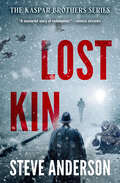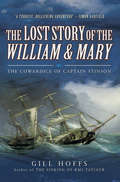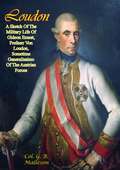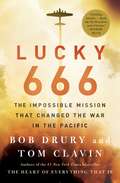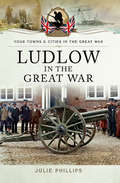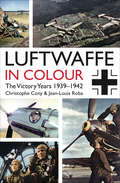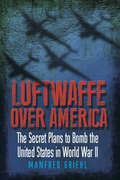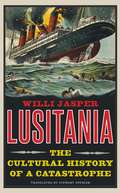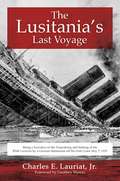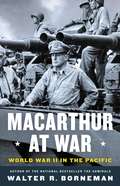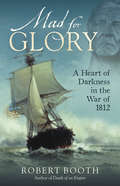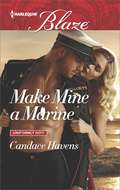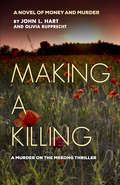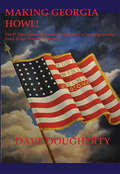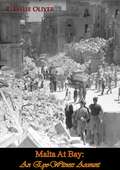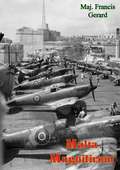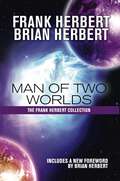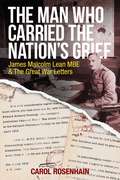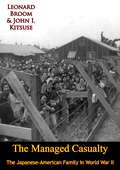- Table View
- List View
Lost Kin (The Kaspar Brothers)
by Steve AndersonBrothers divided by WWII reunite on a mission of justice in the chaos of early Cold War Europe in this historical espionage thriller. Occupied Munich, 1946: Irina, a Cossack refugee, confesses to murdering a GI, but American captain Harry Kaspar doesn&’t buy it. As Harry scours the devastated city for the truth, it leads him to his long-lost German brother, Max, who returned to Hitler&’s Germany before the war. Max has a questionable past, and he needs Harry for the cause that could redeem him: rescuing Irina&’s stranded clan of Cossacks. Disowned by the Allies, they are now being hunted by Soviet death squads—the cold-blooded upshot of a callous postwar policy. As a harsh winter brews and the Cold War looms, Harry and Max embark on a desperate rescue mission along the German-Czech border. As a mysterious figure shadows them, everyone is suspect—even those who have pledged to help. But before the Kaspar brothers can save the innocent victims of peace, grave secrets threaten to damn them all.
The Lost Stars: Shattered Spear
by Jack CampbellThe New York Times bestselling author of The Lost Fleet returns to the “strong saga”* of a rebellion against a totalitarian regime and the determination of two people to create a better future in the farthest reaches of the colonized galaxy... The Syndicate Worlds continue to splinter as more star systems pledge allegiance to President Gwen Iceni, General Artur Drakon, and the new government they’re establishing at Midway. But the toxic legacy of Syndicate rule continues to undermine their efforts as the rebels encounter difficulty trusting one another and believing their new leaders’ promises of freedom from tyranny. Before Iceni and Drakon can put their house in order, they must deal with an even greater threat. An enigma warship has appeared and vanished near a Syndic colony. If the aliens are capable of jumping into other human-occupied star systems, then billions of people could be vulnerable to a hostile invasion fleet anywhere they choose to strike. But an even greater vulnerability lies with Iceni and Drakon, as a once-trusted adviser-turned-saboteur plans revenge...
The Lost Story of the William and Mary: The Cowardice of Captain Stinson
by Gill HoffsThe emigrant ship William and Mary departed from Liverpool with 208 British, Irish, and Dutch emigrants in early 1853. Captained by young American Timothy Stinson, the vessel was sailing for New Orleans when the ship wrecked in the Bahamas in mysterious circumstances. Instead of grounding the ship on a nearby shore or building rafts for the passengers, Stinson and the majority of his crew sneaked away in lifeboats murdering at least two of the emigrants with a hatchet as they did so and reported the ship sunk with all on board lost. But the passengers kept the ship afloat and two days later were rescued by heroic wreckers as the ship went down. Now, over 160 years on, the tale of the two murdered in Bahamian waters and the hundreds who escaped thanks to kindly wreckers can finally be told. Stinson is no longer getting away with murder.
Loudon: Sometime Generalissimo Of The Austrian Forces
by Col. G. B. MallesonFew Generals left such a shining legacy of military genius and glory than Frederick the Great and his Prussian army, however, this reputation was hard fought and grimly won against the forces of Austria. The leading Austrian general, who frustrated many of Frederick's designs, was General Frieherr von Loudon, a soldier through and through. In this detailed biography, noted military author Colonel Malleson traces Loudon's rise from obscurity to the forefront of the Austrian military effort of the Seven Years War. One of the few generals to have bested the Prussians; he won brilliant victories at Hochkirch, Kunersdorf, Landshut, Glatz and Schweidnitz. Frederick himself when talking over the events of the war, then a thing of the past, with his generals, he exclaimed: "We all of us made mistakes, except my brother Henry and Loudon."
Louise's Lies: A 1940s Spy Thriller Set In Wartime Washington D. C. (The Louise Pearlie Mysteries #6)
by Sarah R. Shaber&“Shaber&’s winning sixth WWII mystery is her best yet&”—from the award-winning author of Louise&’s Chance and Louise&’s Crossing (Publishers Weekly, starred review). When a body is discovered in a Washington bar, government girl Louise Pearlie is forced into a role of lies and deception. On a bitterly cold night in December 1943, Louise Pearlie and her friend Joe Prager are enjoying a quiet drink in the Baron Steuben Inn when a bloodstained body is discovered behind the bar. Although the victim had been a regular customer, no one seems to know anything about him. When it turns out there is a link to Louise&’s top-secret work at the OSS, she is ordered to find out as much as possible about the murder while keeping the connection secret from those involved, including the investigating police detective. Although Louise has been trained to keep secrets, the constant deception is taking its toll—especially when she discovers that she&’s not the only customer at the Steuben that night with something to hide. Will Louise&’s silence result in an innocent man being arrested for murder? &“[Louise&’s] sixth adventure is a worthy addition to the franchise.&”—Kirkus Reviews &“Shaber does a fine job portraying the plight of alien residents in wartime Washington, besides conveying the hectic atmosphere of a city whose resources are stretched to the limit by an influx of new workers.&”—Publishers Weekly (starred review)
Love and the Stubborn (Gods of War #2)
by Xenia MelzerGods of War: Book IIAll is fair in love and war. By now, Renaldo has found out the hard way how utterly stupid this statement is once you've met your match. And Casto won't give an inch in their ongoing war for love. After a tumultuous start to their relationship, Renaldo and Casto seem to have finally reached calmer waters. But just when Renaldo starts getting comfortable and thinks he can relax, things get out of hand again. His old enemy, the Good Mother, is dangerously close to defeating the divine brothers by reaching out to what is most dear to him. Casto still clinging to his stubborn pride is all the plotters need to drive him and Renaldo apart. Burdened by the secrets of his past, Casto fights with everything he's got not only to save his life, but also to secure his future happiness. Facing the destruction of everything they have built together, Renaldo and Casto must choose between pride and love.
Lucky 666: The Impossible Mission
by Bob Drury Tom ClavinFrom the authors of the New York Times bestselling The Heart of Everything That Is and Halsey's Typhoon comes the dramatic, untold story of a daredevil bomber pilot and his misfit crew who fly their lone B-17 into the teeth of the Japanese Empire in 1943, engage in the longest dogfight in history, and change the momentum of the War in the Pacific--but not without making the ultimate sacrifice.It is 1942, the Japanese war machine has rolled up nearly all of the Pacific Theater, and American forces are clinging to what little unconquered territory remains. While US Marines claw their way across Guadalcanal, small contingents of US Army Airmen make their way to the lonely, embattled Allied airbase on Papua New Guinea. Their mission: to defend Australia from invasion, harass Japanese supply lines, fly perilous bombing missions over enemy-held strongholds, and make reconnaissance runs to provide intelligence for America's nascent island-hopping campaign. Among these men are the pilot Captain Jay Zeamer and the bombardier Sergeant Joseph Raymond Sarnoski, whose swashbuckling reputations precede them. Zeamer, who cannot convince his superiors to give him his own plane, teams up with Sarnoski to recruit a crew of fellow misfits to rebuild a dilapidated B-17 bomber from spare parts in the base's junkyard. They christen the plane Old 666, naming it from its tail identification numbers. In June 1943, Zeamer and Sarnoski and their crew volunteer for a 1200-mile suicide mission into the heart of the Japanese Empire that may well change the course of the war--but which only one of the two friends will survive. In Lucky 666, Drury and Clavin bring to vivid life one of the last great untold stories of World War II. Featuring personal letters, diaries, US Army Air Force after-action reports, even the translated Japanese Imperial Air Force's official account of the longest dogfight in history, Lucky 666 is a tale of friendship, heroism, and sacrifice set against the horrific backdrop of vicious aerial warfare, wounded crewmates, and a white-knuckle emergency landing in the jungles of New Guinea--a must-read for anyone who loves pulse-pounding narrative nonfiction.
Ludlow in the Great War (Your Towns & Cities in the Great War)
by Julie PhillipsWars affect everyone. Whether they are fought on the battlefields or on the home front, by the armed forces or civilians, sacrifices have to be made, and everyone suffers one way or another. This book gives a flavour of what it was like to live in Ludlow through the Great War years. Ludlow was proud to send its brothers, husbands, uncles and fathers to fight for King and Country, many of whom had never been far from home before, some who came from decorated service backgrounds for whom the armed services was in their blood. Rich or poor, farm worker, office manager or son of a wealthy estate owner, they all united to defend their town and protect British values and way of life. Life continued as usual for many of those on the home front despite, amongst other things, the introduction of DORA, rationing and the loss of the labour force from the farms. Ludlow was already generous in its giving to the poor but this was taken to a whole new level with the introduction of many national and local war charities. They knitted, sewed, auctioned and sung their way through the war even a patriotic donkey called Willie and a pig did their bit by being auctioned several times to raise money for the war effort.This show of patriotism and stoicism was made against the backdrop of a bloody and heinous war that went on far longer than anticipated. The constant threat of receiving the dreaded telegram indicating their loved ones fate was never far from the minds of Ludlow's civilians, yet the people of Ludlow kept the home fires burning brightly.
Luftwaffe in Colour: The Victory Years
by Christophe Cony Jean-Louis RobaA photo-packed look at the men and machines of one of history&’s legendary air forces. This remarkable work explores the Luftwaffe as it truly existed day-to-day, underneath the propaganda of their own regime and the stories of their enemies. In Hitler&’s Germany, color photography was primarily co-opted for state purposes, such as the military publication Signal or the Luftwaffe&’s own magazine, Der Adler. But a number of men had cameras of their own, and in this painstakingly acquired collection, we can witness true life on Germany&’s airfields during the period of the Luftwaffe&’s ascendancy. Not only do we see famous planes such as the Me-109, Ju-87, and He-111, but the wide variety of more obscure types with which the Germans began the war. The array of Arados, Dorniers, Heinkels—not to mention elegant four-engine Condors—that were initially employed in the war are here in plain sight and full color, providing not only an insight into WWII history but a model maker&’s dream. Just as fascinating are the shots of the airmen themselves, along with their ground crews—full of confidence and cheer as they bested every other air force in Europe during these years, with the single exception of the RAF&’s Fighter Command in late summer 1940. But that was no big stumbling block to the Luftwaffe, which had bigger fish to fry in Russia and North Africa the following year. &“Both volumes [The Victory Years and From Glory to Defeat] are a fantastic addition to your aviation library. The reproduction quality is superb.&” —War History Online
Luftwaffe Over America: The Secret Plans to Bomb the United States in World War II
by Manfred GriehlThe plans that Nazi Germany had to raid - and bomb - New York and the eastern seabord are revealed in this book. They were were based on the use of transoceanic aircraft planes, such as the six-engined Ju 390, Me 264 or Ta 400, but the Third Reich was unable to produce such machines in sufficient numbers. If the Soviet Union had been conquered, however, these plans would have become a reality. With the seizure of vital resources from the Soviet Union the Wehrmacht would have had enough fuel and material to mass-produce giant bomber aircraft: it was a near run thing. The collapse of the Wehrmacht infrastructure and the end of the Thousand-Year Reich ensured that plans for long-range remote-controlled missiles never got off the drawing board and were never manufactured. Manfried Griehl makes it clear that until the collapse, numerous secret research laboratories seemed to have worked in parallel seeking nuclear power and explosives. Only classified material held within British, French and American archives can prove whether these groups were close to perfecting small atomic explosives. But, without a shadow of doubt, Germany was far more technologically advanced by the end of 1944 that has been previously suspected.
Lusitania: The Cultural History of a Catastrophe
by Willi Jasper Mr Stewart SpencerA fascinating reassessment of a turning point in the First World War, revealing its role in shaping the German psyche On May 7, 1915, the Lusitania, a large British luxury liner, was sunk by a German submarine off the Irish coast. Nearly 1,200 people, including 128 American citizens, lost their lives. The sinking of a civilian passenger vessel without warning was a scandal of international scale and helped precipitate the United States' decision to enter the conflict. It also led to the immediate vilification of Germany. Though the ship's sinking has preoccupied historians and the general public for over a century, until now the German side of the story has been largely untold. Drawing on varied German sources, historian Willi Jasper provides a comprehensive reappraisal of the sinking and its aftermath that focuses on the German reaction and psyche. The attack on the Lusitania, he argues, was not simply an escalation of violence but signaled a new ideological, moral, and religious dimension in the struggle between German Kultur and Western civilization.
The Lusitania's Last Voyage: Being a Narrative of the Torpedoing and Sinking of the RMS Lusitania by a German Submarine off the Irish Coast May 7, 1915
by Geoffrey Wawro Charles E. Jr.A first-hand account of the Lusitania’s doomed final voyage.On May 7, 1915, the German U-boat U-20 fired a torpedo into the side of the passenger liner RMS Lusitania as it passed the Old Head of Kinsale in Ireland on its way to Liverpool, England. This act of war had a terrible toll-of the 1,962 passengers and crew, 1,191 lost their lives, many of them women and children.One of the passengers on the ship was Charles E. Lauriat, Jr., a rare book dealer who travelled regularly to London for business. When the German embassy placed a warning in New York papers warning that any ships of Great Britain and her allies would be considered fair targets, Lauriat, along with most of others, dismissed the notion that a civilian liner would actually be attacked.Lauriat’s memoir of the journey recreates the torpedo attack-describing the listing ship as it filled with water and people scrambled for lifeboats, too often finding them inaccessible or unusable-and details the rescue that came too late for most of his fellow passengers. Lauriat then points out the many faults of the official inquiry, telling the true story of that tragic day.With a new foreword and photos of the ship, The Lusitania’s Last Voyage is a gripping account of one of history’s greatest naval disasters.Skyhorse Publishing, along with our Arcade, Good Books, Sports Publishing, and Yucca imprints, is proud to publish a broad range of biographies, autobiographies, and memoirs. Our list includes biographies on well-known historical figures like Benjamin Franklin, Nelson Mandela, and Alexander Graham Bell, as well as villains from history, such as Heinrich Himmler, John Wayne Gacy, and O. J. Simpson. We have also published survivor stories of World War II, memoirs about overcoming adversity, first-hand tales of adventure, and much more. While not every title we publish becomes a New York Times bestseller or a national bestseller, we are committed to books on subjects that are sometimes overlooked and to authors whose work might not otherwise find a home.
MacArthur at War: World War II in the Pacific
by Walter R. BornemanThe definitive account of General Douglas MacArthur's rise during World War II, from the author of the bestseller The Admirals.World War II changed the course of history. Douglas MacArthur changed the course of World War II. MACARTHUR AT WAR will go deeper into this transformative period of his life than previous biographies, drilling into the military strategy that Walter R. Borneman is so skilled at conveying, and exploring how personality and ego translate into military successes and failures.Architect of stunning triumphs and inexplicable defeats, General MacArthur is the most intriguing military leader of the twentieth century. There was never any middle ground with MacArthur. This in-depth study of the most critical period of his career shows how MacArthur's influence spread far beyond the war-torn Pacific.
Mad For Glory: A Heart of Darkness in the War of 1812
by Robert BoothWhat if a naval captain went rogue with an American battleship? In October, 1812, as the 32-gun U.S. frigate Essex ventured out against the British enemy, only one man had any idea that this cruise would turn into the longest, strangest naval adventure in American history. That man was Captain David Porter, who had decided to run off with the navy's ship and its three hundred men to fight a separate Pacific war--one of privateering, pillaging, and orgies. Drawing on Porter's own writings and the accounts of eyewitnesses, the author memorably recounts the events of a dark and fatal voyage in which David Porter crosses the line from commander to cult-leader, from improbable fantasy to disastrous reality. In a tale so amazing that it reads like fiction, Porter, impelled by his own demons and by rivalry with the ghostly British buccaneer Lord Anson, took his men and boys on a seventeen-month mystery tour that did not end until he had disrupted the Chilean revolution, captured the entire English whaling fleet (manned mainly by Americans), vanished into the enchanted Galapagos, and re-emerged in Polynesia, where he made himself the conqueror-chief of the stone-age Nukuhivans. In the end, when he sought redemption with a glorious victory over a British opponent, he failed terribly and sacrificed the lives of one-third of his crew to his personal notions of heroism. Robert Booth tells the story of the ill-fated Essex with accuracy, immediacy, and a broad vision of its meanings as an epic of war, a gripping tale of the sea, a brilliant portrait of a disturbed and disturbing American hero, and a geo-political thriller that sheds new light on the origins of U.S. imperialism, the tragedy of missed opportunities, and the disastrous and permanent impact of Porter's rampage on the peoples of the Pacific.
Make Mine a Marine
by Candace HavensSubject: Lieutenant Colonel Matt Ryan Mission: Keep things professional...no matter how hard-or hot-it gets! Matt Ryan wants to settle down to a peaceful life as a helicopter instructor at the local base. When he meets free-spirited antiques dealer Chelly Richardson and finds out she's homeless, well, he has to help. But her living in his pool house means the wild-at-heart woman who is stealing his dreams each night is just a bit too close... Chelly is determined to pay back the man who helped her during one of the toughest points in her life. She will also save the straitlaced Marine from the disaster that is her by keeping her hands off his hot, hot body. But the more she tries to stay away, the more fate seems to shove them together.
Making a Killing
by John L. Hart Olvia RupprechtThe CIA's most valuable assassin, Agent J.D. Mikel, wasn't supposed to fall in love with anyone - especially not Kate Morningside, a woman coveted by another powerful world player. When Kate is kidnapped, J.D. is pulled into a dangerous game of cat and mouse, and one false move could cost him everything. Indeed, there are players - and then there are the masters who make the rules only to break them. It's not an even match for those joining an epic search for Kate on a twisted dark hunt down the Mekong River in the midst of a bitterly disputed war: Izzy, a brilliant young psychiatrist assigned to the Army's 8th Field Hospital and counting the days until he can return home; and his best friend Gregg, a gifted psychologist who served his time only to be driven back to Vietnam by his own inner demons and a rivalry with Mikel that burns as intensely as napalm. There are other wars within wars in turbulent 1970. From the CIA to the American mafia to an International cartel helmed by a master of the sadistic, all eyes are on Southeast Asia's Golden Triangle. And when it comes to a certain cash crop flourishing under the dominion of the mysterious Poppy King, everyone wants a piece of the action. Money talks. The currency? Heroin. It's a spinning maze of intrigue, politics, and mind games; a hotbed where sex, drugs, and Janis Joplin aren't always a beautiful thing. But even when no one turns out to be quite who or what they seem, one rule remains fast across the Devil's chessboard: Winners live. Losers die. The sequel to the national bestseller THERE WILL BE KILLING, MAKING A KILLING artfully weaves a spellbinding tapestry of dark history, psychology, and seduction - the best and worst of our humanity . . . and the hunger of our hearts. PRAISE FOR THERE WILL BE KILLING: "A riveting journey into the perils of war and the darkness of the human heart - stylish and provocative." - Tara Janzen, New York Times bestselling author "There Will Be Killing is mesmerizing...a chilling and astonishing novel by authors who know their way around a story." - Peggy Webb, USA Today bestselling author of The Language of Silence "Make sure you have some time to spend because you won't want to put it down until you turn the last page." - Book Bug
Making Georgia Howl!: The 5th Ohio Volunteer Cavalry in Kilpatrick's Campaign & the Diary of Sgt W.H. Harding
by Dave DoughertyThe 5th Ohio Volunteer Cavalry Regiment fought over three years, from March 1862 to General Johnson’s surrender in April 1865. It played a major role in Kilpatrick’s Cavalry Corps on Sherman’s March to the Sea; told as an overview of operations and through the diary of Sergeant William H. Harding. Confederate histories have often reported the regiment decimated and defeated in every battle, but this study presents the truth of the matter for the first time. Fighting in Judson Kilpatrick’s 3rd Cavalry Division during Sherman’s campaign through Georgia and the Carolina’s doing everything that could be expected of them and acquitted themselves honorably against the Confederate commanders – Joseph Wheeler and Wade Hampton. This volume is the definitive study of the 5th Ohio and Kilpatrick’s campaign in Sherman’s army from Atlanta to the end of the war. Bonuses include the diary and letters of Commissary Sergeant William H. Harding present in Company K of the 5th OVC from August 1862 to July 1865.
Making Jet Engines in World War II: Britain, Germany, and the United States
by Hermione GiffardOur stories of industrial innovation tend to focus on individual initiative and breakthroughs. With Making Jet Engines in World War II, Hermione Giffard uses the case of the development of jet engines to offer a different way of understanding technological innovation, revealing the complicated mix of factors that go into any decision to pursue an innovative, and therefore risky technology. Giffard compares the approaches of Britain, Germany, and the United States. Each approached jet engines in different ways because of its own war aims and industrial expertise. Germany, which produced more jet engines than the others, did so largely as replacements for more expensive piston engines. Britain, on the other hand, produced relatively few engines--but, by shifting emphasis to design rather than production, found itself at war's end holding an unrivaled range of designs. The US emphasis on development, meanwhile, built an institutional basis for postwar production. Taken together, Giffard's work makes a powerful case for a more nuanced understanding of technological innovation, one that takes into account the influence of the many organizational factors that play a part in the journey from idea to finished product.
Malta At Bay: An Eye-Witness Account
by R. Leslie OliverIn this detailed eye-witness account the author describes the realities of the fighting over and around Malta during World War II, up to and including 21 March 1942, when Malta became the subject of more heavy attacks. Written under the incessant bombardments that the small island was subjected to, R. Leslie Oliver records the unfailing courage of the defenders of the George Cross Island.
Malta Magnificent
by Maj. Francis GerardMalta Magnificent, written by Major Francis Gerard and first published in 1943, tells of the siege of Malta, one of the epic incidents in the world's history. For two years, the Luftwaffe was hurled against the island day and night, but Malta and its people stood indomitable and unshaken throughout, and the "George Cross Island" held. A gripping account.
Man of Honor (Battle Scars #3)
by Diana Gardin"MAN OF HONOR is sweet and sexy in all the right places." --New York Times bestselling author J.B. SalsburyThe best rules are the ones worth breaking . . . After his mother's funeral, ex-Army Ranger Drake Sullivan wants only to disappear and drown his sorrows in whiskey. Then he sees her: Mea Jones. An untamed, sexy-as-hell whirlwind of energy. A few years ago, she showed him the best-and hottest-night of his life, then walked away without a backward glance. But he's never stopped wanting more.When it comes to guys, Mea has rules. One night. No dating. Whatever it takes to have control and keep it. With Drake, it's all heat and hurt and hunger, and pretty much the opposite of control. And that makes him dangerous as hell. Mea has her own demons, and falling in love-or even in lust-is strictly a no-go proposition. But she soon finds out Drake is incredibly single-minded when it comes to getting what he wants. And he's determined to be the exception to all her rules. Reader advisory: The heroine's past deals with dark elements some readers may find disturbing. Recommended for mature audiences only.Battle Scars series:Book 1: Last True HeroBook 2: Saved by the SEALBook 3: Man of Honor"Drake and Mea set the pages on fire! I was hooked from the very start!" --J.L. Berg, USA Today bestselling author"A sexy, brooding hero and a feisty, fierce heroine make for undeniable chemistry and scorching heat between the sheets. You'll be rooting for the characters to get together and to get it together from the very first page." --Jay Crownover, New York Times and USA Today bestselling author"A heart wrenching story of the healing power of love. Gardin handles tough issues with sensitivity and poignant storytelling. Man of Honor will have you rooting for Drake and Mia and reaching for the tissues." --Marie Meyer, author of The Turning Point "An emotional, sexy, and touching read with two unforgettable and amazingly resilient characters. Man of Honor is an utterly devour-able book and I loved every second!" --Jillian Stein, READ-LOVE-BLOG
Man of Two Worlds: 30th Anniversary Edition
by Frank Herbert Brian HerbertAfter an unfortunate spaceship accident, the hedonistic and ambitious human Lutt Hansen, Jr., finds himself sharing his body and mind with a naive alien dreamer. The two have to survive numerous dangers, schemes and assassination attempts . . . but can they survive each other?
The Man who Carried the Nation's Grief: James Malcolm Lean MBE & The Great War Letters
by Carol Rosenhain‘I do feel the loss of my two boys, they was my all …’ wrote grieving father Ernest Watts following the death of his two sons. Like thousands of Australians during World War I, Ernest Watts received his tragic news through the office known as ‘Base Records’. This letter was just one in a series of correspondence that lasted the duration of the war and well into the post-war period. Every letter was answered with patience and courtesy and every response carried the same signature: J.M. Lean. The Man who Carried the Nation’s Grief describes the extraordinary work of James Lean, whose office at times received over 100 letters a day from distressed families. The letters selected by author Carol Rosenhain are quoted verbatim in all their rawness, the grief, anger and disbelief of the writer signifying wounds that would take years to heal while others never would. Like those of Ernest Watts, the letters often form part of a chain of correspondence that lasted well beyond the Armistice of 1918. For one shattered father, the fate of his missing boy would never be resolved, his son’s final resting place only discovered in Pheasant Wood almost a century after he met his death. Given his crucial role as the link between anxious families and the bureaucracy of the AIF, James Lean’s remarkable work is a surprising omission from the vast body of World War I literature. Carol Rosenhain’ s book rectifies this omission with a portrait of Lean himself and the grim task at which he excelled. This is a book that describes the impact of war on families in all its devastating reality.
The Managed Casualty: The Japanese-American Family in World War II
by Leonard Broom John I. KitsuseTHIS STUDY is an assessment of one major aspect of the adjustment of Japanese Americans to the series of events comprising their removal from the communities of the Pacific Coast early in World War II, their sequestration in temporary centers under governmental control, and their eventual release. It is in a sense an "impact" study in that attention is directed toward the effects administrative policies had on family groups and the resources these groups commanded to adapt to and ameliorate the conditions imposed upon them.The preoccupation of the present study is easily justified. The importance of the family, in Japan as well as in the organization of the Japanese communities in the United States, makes this aspect of the social organization of the minority group a major concern for a rounded understanding of the evacuation. The relevance of the family as the unit of study is also indicated by the administrative policy which explicitly directed that family units be maintained in the processing of the population through the evacuation and relocation programs.
Marie Benedict Historical Fiction Bundle
by Marie BenedictNew York Times and USA Today bestselling author Marie Benedict has captivated readers with her gorgeous stories of the women forgotten to history.Now, get four of her acclaimed novels in this specially priced e-book bundle: The Other Einstein, Carnegie's Maid, The Only Woman in the Room, and Lady Clementine PLUS an exclusive excerpt from The Mystery of Mrs. Christie."... Intimate and immersive historical novel.... Prepare to be moved by this provocative history of a woman whose experiences will resonate with today's readers."—Library Journal on The Other Einstein"A sensational novel that turns the conventional Cinderella story into an all-American triumph."—Sarah McCoy, New York Times and international bestselling author of The Mapmaker's Children and The Baker's Daughter on Carnegie's Maid"Benedict paints a shining portrait of a complicated woman... Readers will be enthralled."—Publishers Weekly on The Only Woman in the Room"Benedict is a true master at weaving the threads of the past into a compelling story for today."—Susan Meissner, bestselling author of The Last Year of the War on Lady Clementine
